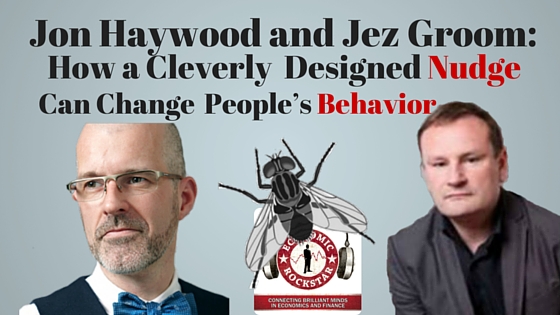049: Jez Groom and Jon Haywood on How a Cleverly Designed Nudge Can Change People’s Behavior – Including How We Pee
Jez Groom is a behavioral economist and co-founder of the behavioral practice #ogilvychange in the United Kingdom.
Alongside Rory Sutherland, Jez has created the Nudge Awards and Nudgestock, bringing the best in behavioral economics to the mainstream.
Jon Haywood is the founder of Ambassadogs and has been working in the Advertising industry for almost 20 years.
Jon has specialised in taking a more consumer (human) perspective of the marketing challenge, working with the likes of Rory Sutherland of #ogilvychange on understanding how behavioural economics can add a significant competitive advantage to the creative ideation process.
Economists:
Rory Sutherland, Paul Dolan, Richard Thaler, Cass Sunstein, Daniel Kahneman, Dan Ariely and Malcolm Gladwell.
Economics:
Behavioural economics, choice architecture, nudge, framing, heuristic, ’Fly in the Urinal’, ‘Piano Stairs’, ‘Stickman’, ‘The Religious Norming and The Begger’ and the ‘Facial Feedback Hypothesis’,
In this episode, you will learn:
- how #ogilvychange is bringing Behavioural Economics into the mainstream.
- about Nudgestock which brings academics and practitioners together to discuss the theoretical and practical intersection of behavioural economics.
- how a ‘Fat Stickman’ pointing to an escalator and a ‘Thin Stickman’ pointing to the stairs can nudge a person to take the stairs.
- about the bathroom tip-jar trick that could net you more tips than ever!
- how re-arranging the choice architecture of a sales product can boost sales.
- how #ogilvychange gave The Times newspaper a ROI of 250 in incremental sales on a 1 investment.
- that offering customers too many choices can affect your bottom-line.
- how changing the environment of sales agents can increase average sales by 185% simply by changing the colours of the walls.
- how we can nudge people to take the stairs rather than the elevator by creating ‘The Piano Stairs’.
- how we can encourage people to bin their litter by simply creating ‘The World’s Deepest Bin’.
- how we can reduce the amount of urine that ends up on the floor by putting a sticker in the urinal.
- why businesses and governments are now embracing behavioral economics.
- and much more!
How a Clever Nudge Can Change People’s Behavior:
The Fun Theory, an initiative by Volkswagen, aims to create ways to encourage people to make a small change in their lives for the better. A nudge is a strategic approach by firms, governments and individuals to encourage people to behave in a way you would like them to behave. Nudging has become quite synonymous with behavioral economics lately, particularly since the release of Thaler’s book ‘Nudge’.
The Piano Stairs:
There is a general consensus that taking the stairs rather than the elevator or escalator can, overtime, make people lead a healthier and happier life. Perhaps that outcome is somewhat extreme, but people may ‘feel better’ if they take the stairs every time. However, how can we encourage people to take the stairs rather than the elevator?
Should we stop the escalator from moving or have an ‘Out of Order’ sign on an elevator? Not a good idea as this would possibly have an undesired outcome as people would end up infuriated. Although they are forced to the take the stairs, the path taken to get from A to B is not desirable. Problems would also arise for those unable to physically take the stairs. We should allow an option but encourage people, if they can, to take the stairs.
Should we send out messages outlining the health and well-being benefits of taking the stairs? Perhaps this could be effective but taking the stairs today will not make someone any fitter or healthier. People will more than likely delay or feel it is pointless.
https://www.youtube.com/watch?v=0Yu62StlsMY
Do you remember or have you seen the 1988 movie Big featuring Tom Hanks? Tom’s character had made a wish, the day before when he was a young boy, to be older. His wish comes true but his mind and behavior is that of his younger self. Tom’s character immortalizes the famous New York toy store, FAO Schwarz, by playing ‘Chopsticks’ on a large piano on the floor. This captured the imagination of many people who wathced his movie and I’m sure the behavioral scientists at The Fun Theory knew exactly how they could now encourage people to take the stairs rather than the escalator.
Enter The Piano Stairs, a fun and interactive experiment to nudge people to take the stairs and to, perhaps, feel better. Check out their video here and the interesting results achieved with this ‘nudge’ from The Fun Theory.
The Urinal Fly:
In this episode of the Economic Rockstar podcast, Jez Groom mentioned how placing a sticker of a fly in a urinal reduced the incidence of mis-direction of toileting by men. Subsequently, I reached out to Jon Haywood from ambassadogs.nl who explained the concept of the Urinal Fly and how a sticker or print of a fly within a urinal is a nudge that changed the behavior of those men in question.
Jon is from Amsterdam and this particular nudge is credited to Amsterdam’s Schiphol Airport. The manager of the cleaning department at Schiphol Airport, Jos van Bedaf, is credited to introducing the urinal fly in order to reduce the amount of spillage. According to Jon Haywood, this had the effect of reducing spillage, resulting in lower clean-up costs and improved toilet conditions. The fly was chosen as it appears insanitary and men can aim at the image. A butterfly couldn’t be chosen as men may aim around this image as it could conjure up an image of beauty that you wouldn’t like to harm.
The World’s Deepest Bin:
Another nudge was developed by The Fun Theory to encourage people to bin their litter and have a litter-free environment. Again, Jon Haywood talks to us about this particular nudge and how a piece of deposited litter passed an internal sensor which activated a sound giving the perception that the litter was falling for 10 seconds.
Recommended Books:
- Thinking, Fast and Slow by Daniel Kahneman
- Nudge by Richard H. Thaler
- Blink by Malcolm Gladwell
- Outliers by Malcom Gladwell
- Freakonomics by Steven D. Levitt and Stephen Dubnar
- SuperFreakonomics by Steven D. Levitt and Stephen J. Dubnar
Resources:
Where to Find Jez Groom:
Where to Find Jon Haywood:
Podcast: Play in new window | Download






